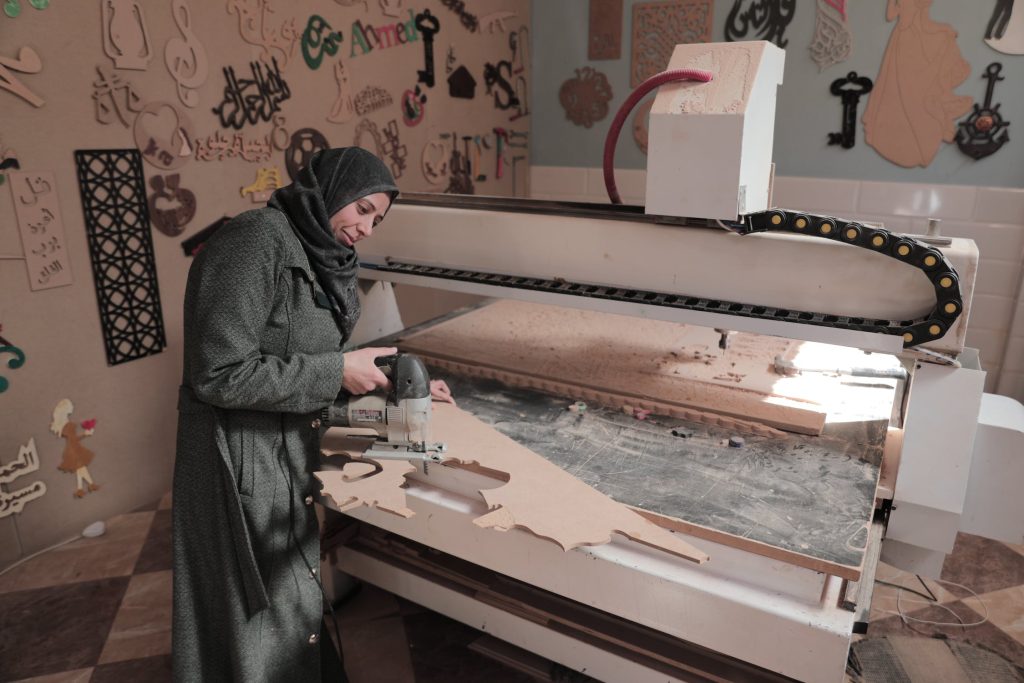In 2023, Catalystas Consulting’s Beatrice Maneshi was requested by IBF International Consulting to act as an economic expert working on behalf of Deutsche Gesellschaft für Internationale Zusammenarbeit GmbH (GIZ) to provide bilateral support to the semi-autonomous Kurdistan Regional Government (KRG) of the Kurdistan Region of Iraq’s High Council for Women Development (HCWD) in developing a five-year economic empowerment strategy.
To stimulate the economy and promote gender equality, Catalystas set in motion the writing of the 2023-2028 women’s workforce participation (WWP) strategy in alignment with the Kurdistan 2030 Vision, the HCWD’s mandate, the Iraqi Gender Action Plan, the United Nations Security Council Resolution 1325 on Women, Peace, and Security (UNSCR 1325), and Sustainable Development Goals: 4-Quality Education; 5-Gender Equality; 9-Industry, Innovation, and Infrastructure; 10-Reduced Inequalities; 16-Peace, Justice, and Stronger Institutions; and 17-Partnerships for the goals.

Over several months, Catalystas worked closely with GIZ’s Private Sector Development and Gender Empowerment and Economic Affairs representatives and members of the HCWD’s team to narrow the scope of focus on economic empowerment programming to the most needed as well as most impactful in the current socio-economic setting of the KRI. As a result, WWP was selected as the key focus of the economic empowerment strategy, with a deep emphasis on realistic intergovernmental coordination to promote an increase in WWP, especially in the private sector. This strategy paper has sought to understand the limiting factors with regard to government, private sector and culture to inform the High Council for Women’s Development’s five-year strategy, specifically addressing:
This women’s economic empowerment strategy has specifically focused on actionable planning, which hinges on women’s access to employment – a core objective of the Kurdistan Presidential Office and the current administration. This strategy has specifically positioned HCWD to pilot partnership and planning with the Ministry of Planning (MoP) and the Ministry of Labor and Social Affairs (MOLSA), which should serve as a learning exercise which can then be expanded to develop effective working relationships with all KRG ministries, as mandated under the law.
To inform how best to increase WWP in the KRI, Catalystas undertook market participatory action research. The research sought to understand the differences between rural and urban settings and to design strategies that would respond to the differing experiences of women seeking employment in rural compared to urban settings, as well as differing levels of education, socioeconomic status, and other demographic characteristics. We also sought to understand the difference in need between blue-collar and white-collar labor settings. Based on this in-depth, six month research study, a feasible and actionable strategy to empower women and increase workforce participation was expertly informed, building on data collected through numerous consultations facilitated by GIZ with HCWD, capacity assessments of key government offices,[1] 45 interviews, three focus groups, and mass public surveys with the private sector employers, business unions, ministerial offices, vocational education educational training centers, civil society organizations, academic and international development actors and institutions, and of course women in Kurdistan seeking employment opportunities.

The findings of this study showed that in 2019, the KRG Ministry of Higher Education and Scientific Research (MOHESR) released a report that noted 52% of undergraduate students in Iraqi Kurdistan are women, demonstrating that women in Kurdistan are obtaining higher education at a higher frequency than their male counterparts. However, their opportunities for employment remain for more limited than men in the same situations. According to the World Bank’s 2022 “Women’s Labor Force Participation in the Kurdistan Region of Iraq: A Study of Social and Psychological Barriers,” women’s workforce participation in Iraqi Kurdistan reaches just 14% – among the lowest in the Middle East, and the world. There are many interrelated reasons for this; for example, the 2022 World Bank report found that social norms are a key factor limiting women’s workforce participation.[2]
The results of the study have been analyzed to effectively inform five focus areas for HCWD and national and international bodies in developing interventions to improve women’s workforce participation in the KRI, including:
Since being written, and in consultation with GIZ and HCWD, the strategy and its incremental action plan for transformative change within the KRG and the KRI’s private sector has been adopted by HCWD. As of January 2024, the strategy has not yet been actualized.

[1]Please see Annex 2: “Assessment of High Council for Women and Development and related Ministerial Focal Points, by Shuana Saxmith in Q4 of 2022.
[2] I.Sen, Z. Afif, V.Gauri, G.Mohamed,”Women’s Labor Force Participation in the Kurdistan Region of Iraq A Study of Social and Psychological Barrier”, World Bank, Policy Research Working Paper 10028, April 2022.
Catalystas Consulting, Lange Voorhout 43, 2514 EC Den Haag, The Netherlands
© Catalystas Consulting. All rights reserved. Privacy and Policy
An Iranian-American with more than ten years of experience in international relations, economic development, and political empowerment, Beatrice is heavily invested in making the world a better place. Her work spans multiple regions of the world, often including high-risk environments, and her clients include non-governmental organizations, governmental bodies, and small-to-medium–sized corporations throughout the US, EU, Middle East, and Sub-Saharan Africa.
Originally focused on the areas of economic development, security, and disarmament, Beatrice turned to the humanitarian field, where she has expanded her expertise to include international security policy, gender equality, and innovation planning. She is a highly skilled grant writer, program designer, auditor, and capacity and impact assessor, as well as an authority on client and donor relations and ethical corporate engagement strategy.
Her personal and professional interests come together in the use of technology and data to provide solutions and insight into human rights, higher education, sexual reproductive rights, and environmental preservation.
We built Lysta as an answer to one of our own problems: the need to quickly assemble teams of experts across various subject matter, geographic, linguistic, and thematic areas for projects and proposals as they arise. We quickly realized that we were not the only ones facing this challenge! With the speed that development projects require hiring, turnaround, and technical insights, we see first hand how helpful it is to have a ready-made database of vetted experts to call on.
For existing and potential Clients, you can access all consultant full profiles by signing up here as a client for free.
For consultants, adding your profile to Lysta means jumping to the top of the list for our clients in recruitment processes. We do the heavy lifting: the CV reviews, interviews, vetting, and personnel management; so when our clients come to us, they know they’re hiring someone they can trust to deliver high quality, timely results. Click here to add your profile for review.
We’re proud to be a link in the chain that connects the best of the best – don’t hesitate to reach out and see how you can put Lysta to work for you!